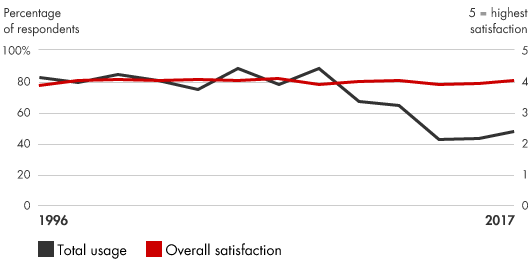Management Tools
Strategic Planning is a comprehensive process for determining what a business should become and how it can best achieve that goal. It appraises the full potential of a business and explicitly links the business’s objectives to the actions and resources required to achieve them. Strategic Planning offers a systematic process to ask and answer the most critical questions confronting a management team—especially large, irrevocable resource commitment decisions.
Usage and satisfaction among survey respondents

How Strategic Planning works:
A successful Strategic Planning process should:
- Describe the organization’s mission, vision and fundamental values
- Target potential business arenas and explore each market for emerging threats and opportunities
- Understand the current and future priorities of targeted customer segments
- Analyze the company’s strengths and weaknesses relative to competitors and determine which elements of the value chain the company should make vs. buy
- Identify and evaluate alternative strategies
- Develop an advantageous business model that will profitably differentiate the company from its competitors
- Define stakeholder expectations and establish clear and compelling objectives for the business
- Prepare programs, policies and plans to implement the strategy
- Establish supportive organizational structures, decision processes, information and control systems, and hiring and training systems
- Allocate resources to develop critical capabilities
- Plan for and respond to contingencies or environmental changes
- Monitor performance
| RELATED TOPICS | HOW BAIN CAN HELP |
|---|---|
Companies use Strategic Planning to:
- Change the direction and performance of a business
- Encourage fact-based discussions of politically sensitive issues
- Create a common framework for decision making in the organization
- Set a proper context for budget decisions and performance evaluations
- Train managers to develop better information to make better decisions
- Increase confidence in the business’s direction

Management Tools & Trends
Five key trends emerged from Bain's survey of 1,268 managers.
Selected references
Collis, Daniel J., and Michael G. Rukstad. “Can You Say What Your Strategy Is?” Harvard Business Review, April 2008, pp. 82–90.
Drucker, Peter F. Managing in a Time of Great Change. Harvard Business Press, 2009.
Gottfredson, Mark, and Steve Schaubert. The Breakthrough Imperative: How the Best Managers Get Outstanding Results. HarperBusiness, 2008.
Hamel, Gary, and C. K. Prahalad. Competing for the Future. Harvard Business School Press, 1994.
Mankins, Michael C. “Stop Wasting Valuable Time.” Harvard Business Review, September 2004, pp. 58–65.
Mintzberg, Henry. The Rise and Fall of Strategic Planning: Reconceiving Roles for Planning, Plans, Planners. Free Press, 1994.
Mintzberg, Henry, Joseph Lampel, and Bruce Ahlstrand. Strategy Safari: A Guided Tour Through the Wilds of Strategic Management. Free Press, 1998.
Porter, Michael E. Competitive Strategy: Techniques for Analyzing Industries and Competitors. Free Press, 1998.
Porter, Michael E. “What Is Strategy?” Harvard Business Review, November/December 1996, pp. 61–78.
Zook, Chris, and James Allen. The Founder’s Mentality: How to Overcome the Predictable Crises of Growth. Harvard Business Review Press, 2016.
Zook, Chris, and James Allen. Repeatability: Build Enduring Businesses for a World of Constant Change. Harvard Business Review Press, 2012.